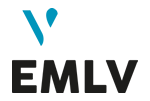The advent of digital technology allows anyone to start a business from anywhere with minimal investment, or even without any capital at all. As the future of work evolves, digital nomads only need a computer and an internet connection to work.
Whether you want to launch an entrepreneurial project alongside your professional activity, take a break from your career, or dive into entrepreneurship full-time, there are many online business opportunities you can start with a small budget.
At De Vinci Higher Education in general, and at EMLV in particular, there are many examples of entrepreneurial projects involving both students and business school graduates who have ridden the digital wave to launch their online businesses.
Here are seven good ideas.
Getting started with dropshipping
Buying, storing, selling and shipping. This is the traditional model of distance selling, which dropshipping is transforming. With minimal investment, dropshipping is a business model in which a third-party supplier stores and ships products to customers on your behalf. It’s one of the best businesses to start because it’s inexpensive and scalable. You don’t need to handle the products yourself; you make the sales and pass the orders to your supplier.
Although it is sometimes criticised for abuses in dropshipping (very low-value, poor-quality products being resold at inflated prices), this model can be ethical if you choose your suppliers carefully. Opt for local or eco-friendly products to meet consumers’ growing expectations for sustainable practices.
Focusing on underserved niches where competition is less fierce maximises chances of success. Also, one must ensure compliance with local and global regulations on online sales, particularly regarding delivery times, withdrawal rights, and transparency about product origins.
Designing and selling (unique) print-on-demand products
Print-on-demand has transformed the creative market. It has never been easier to design and print a physical object, whether it’s a book, an album, a T-shirt, a cap, or even personalised decorations. Once your design is complete, an online platform can host your creation and sell it directly to your customers.
Thanks to increasingly powerful online tools, you can easily personalise your creations and even take advantage of ready-to-use templates that you can adapt in just a few clicks. These platforms also handle production, packaging, and shipping, so you can focus solely on design and promotion.
Consumers are increasingly sensitive to authenticity and originality. Print-on-demand products meet these expectations. For example, you could create eco-friendly designs or offer limited edition products to appeal to a specific audience.
Finally, to maximise your revenue, consider combining your business with an appropriate communication strategy, such as using social media or specialised marketplaces. This will allow you to create a real community around your brand while generating regular sales.
Creating digital products
Digital creation opens up many opportunities for entrepreneurs. Music, online courses, training, e-books or podcasts: there are many formats for monetising your skills or passions. You don’t have to manage recurring manufacturing or shipping costs, which guarantees high margins.
Demand for personalised or specialised digital products has grown rapidly. Identify your audience’s needs and turn your skills into attractive products. Platforms such as Teachable, Podia, and Gumroad simplify the creation and sale of digital content.
Current trends include:
- Online courses and certification training: Internet users are looking for practical content, such as professional training or tutorials to develop specific skills (software, marketing, wellness, etc.).
- Ready-to-use tools and templates: Customised Excel files, Canva templates and graphic resources are highly sought after by freelancers and small businesses.
- Podcasts and audio content: Monetise your episodes through subscriptions or sponsorships, targeting specific niches such as education, health or productivity.
To be successful, focus on content quality, professional layout and an effective promotion strategy. Build a community using social media or newsletters: you’ll build audience loyalty and boost your sales.
Sell a service (but make it effective)
If you have skills to promote, selling services offers an excellent opportunity. You are selling your time and expertise. Writer, graphic designer, virtual assistant, SEO specialist, coach: these are all areas where you can offer your services or set up a consulting business.
Platforms such as Malt, Upwork, and Fiverr make it easy to connect with clients. If you enjoy writing, become a web editor, ghostwriter or scriptwriter for podcasts and YouTube videos. With video and audio formats becoming increasingly popular, these skills are in high demand.
To stand out, specialise in a specific field or target a niche market. For example, offer graphic design services for small local businesses or become a personal development coach for a targeted audience.
Finally, focus on a clear strategy: build your portfolio, ask your first clients for reviews, and use social media to promote your services. This will help you create a strong online presence that inspires confidence and attracts new projects.
Selling handmade products (nothing beats handmade)
If you have a creative spirit and a talent for making unique products – soap, candles, decorations or other items – you can start a craft business from home. This model is based on creating physical products, but digital technology simplifies order taking and shipping.
Recently, demand for handmade and eco-friendly products is booming. Consumers are looking for authentic, environmentally friendly products. Highlight local or natural raw materials to meet these expectations.
Platforms such as Etsy, Shopify, or local marketplaces allow you to reach a wider customer base. You can also promote your creations via social media, where short, authentic videos on platforms such as Instagram or TikTok attract an engaged audience.
To succeed, pay attention to how you present your products. Invest in high-quality photos and detailed descriptions that showcase your expertise.
Also consider packaging, which can become a differentiating factor by reflecting your brand identity. Consider expanding your business by offering limited collections or personalised products, two strong trends that appeal to customers.
Build a (real) audience that you can monetise
Influencers have one main asset: their audience. This audience can be extremely valuable to companies seeking to engage directly with committed communities. In an ultra-connected world, capturing and retaining attention has become a real asset. The keywords for success are rigour, consistency and authenticity.
To get started, identify a theme or niche that you are passionate about and for which you can produce regular content. Develop a visual identity and tone that sets you apart. Use analytics tools to understand your audience’s expectations and refine your strategy.
Once you have built up your audience, monetise it through:
- Sponsored partnerships: Collaborate with brands that align with your values.
- Selling products or services: Offer merchandise, training courses or consultations.
- Subscriptions or exclusive content: Offer access to premium content via platforms such as Patreon or YouTube Memberships.
Become a virtual event organiser
Virtual events have become an essential component of business strategies, reinforced by the democratisation of remote and hybrid working. As a virtual event organiser, you can design and manage online conferences, workshops, training sessions, trade shows or meetings for any type of organisation.
New trends include:
- Hybrid events: Combining on-site and online participants to reach a wider audience.
- Interactive sessions: Integrating live polls, Q&As, or collaborative tools to maintain attention.
- Event customisation: Creating tailor-made experiences according to the needs of each company or sector.
The metaverse, although still emerging, is becoming a serious option for immersive training courses, meetings and trade shows. Platforms such as Spatial and Gather Town already allow events to be organised in virtual reality. By mastering these technologies, you can position yourself as an expert in organising the events of the future.
While digital technology has made entrepreneurship considerably easier, launching an online business is not necessarily a simple task. Like any business, you will need methods, patience, perseverance and motivation, but you will also need to surround yourself with the right people and know where to find good advice and mentors.
In short, rely on the soft skills and hard skills you acquire at Business School to grow your business even faster.






















